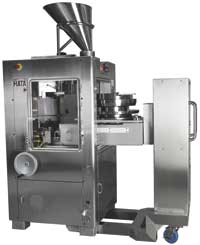Pressing Issues
Talking to representatives from The Elizabeth Companies, a leading manufacturer of tablet presses and other equipment vital to the nutraceutical and pharmaceutical industries, it's clear that today's nutraceutical companies are demanding far more from their equipment.
Originally Published NO June 2010

Talking to representatives from The Elizabeth Companies, a leading manufacturer of tablet presses and other equipment vital to the nutraceutical and pharmaceutical industries, it's clear that today's nutraceutical companies are demanding far more from their equipment. Ryan Keefer and Don O'Donoghue talk about how nutraceutical companies are looking to maximize their business through equipment design. Keefer is general manager for Elizabeth-Hata International (North Huntingdon, PA), the company's tablet-press division, while O'Donoghue is corporate sales manager for The Elizabeth Companies and is located at the company's Elizabeth-Scheu & Kniss division (Louisville, KY), which is dedicated to tablet-press replacement parts, turrets, and tablet-press rebuilding services.
Nutritional Outlook: What are some features that nutraceutical companies are currently looking for in their tablet presses?
Don O'Donoghue: Companies are looking to be compliant with current good manufacturing practices. Whereas the nutritional industry had been using more-manual types of presses, we've noticed that companies are now looking for more-modern versions of their equipment-stainless-steel bodies, closed compression zones, machines that offer automated data collection and recipe storage-features that the pharmaceutical industry has pursued for a long time.
Ryan Keefer: Companies are also looking for machinery that can produce a far more consistent product, regarding weight control and tablet size.
NO: In terms of production, what are companies looking for?
Keefer: Companies are looking for better product yield, higher speeds, and less product waste.
O'Donoghue: In this lean manufacturing economy, you can't just put a product on the shelf and hope that someone buys it. You have to wait until the order comes in, and then you have to be able to produce product quickly. That's where more-efficient machinery comes into play.
NO: What about versatility?
O'Donoghue: Companies are trying to be more versatile, so they want a tablet press that can make a variety of tablets.
Keefer: In addition to the ability to produce different tablet sizes and types, they also want to be able to accommodate various-sized batch runs, whether they're small, medium, or large.
NO: How has a flailing economy affected the industry's equipment purchasing?
O'Donoghue: Instead of buying new machinery, a lot of customers are looking at refurbishing and repairing existing machinery.
Keefer: Right now, there's also an oversaturation of tablet presses in the market-some of it due to pharmaceutical companies merging and consolidating production sites. So there's additional equipment now on the market for nutraceutical companies that maybe they couldn't really consider before.
NO: What are some recent developments for the company?
O'Donoghue: In addition to tablet presses, we've been getting more involved with encapsulation tooling and encapsulation parts. Tableting is an art. It has its challenges, and this is where encapsulation can come into play in certain circumstances. There are some factors and certain product applications for which encapsulation is sometimes easier than a solid-dosage tablet.
NO: How does your ElizaTab program aid nutraceutical companies?
Keefer: With ElizaTabs, we basically create a prototype tablet with the actual size, color, and decoration, such as embossing or engraving, that a company wants to use. Marketing teams can use that mockup to finalize a tablet's design, before actually ordering the tooling to produce the tablet.
NO: How else are you helping your customers in these challenging economic times?
O'Donoghue: We have more than 50 years of experience in the tablet-press industry. Expertise, quality control, troubleshooting, training, and customer service are part of every product that we offer. And those are things that I would say every market trying to cut costs is in need of now. Any expertise that we can provide in order to help our nutritional customers produce a more-efficient, better-quality product helps.
Prinova acquires Aplinova to further increase its footprint in Latin America
April 7th 2025Prinova has recently announced the acquisition of Brazilian ingredients distributor Aplinova, which is a provider of specialty ingredients for a range of market segments that include food, beverage, supplements, and personal care.
The Nutritional Outlook Podcast Episode 39: Nutritional Outlook's Ingredients to Watch in 2025
February 25th 2025In this episode, Nutritional Outlook interviews Scott Dicker, market insights director from market researcher SPINS, about ingredients and product categories nutraceutical and nutrition product manufacturers should watch in 2025.










